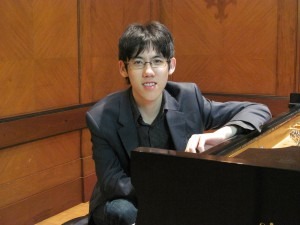The Intimacy of Creativity, HKUST

credit : http://www.curtis.edu/
Zhang Hao Chen, the winner of the 13th Van Cliburn International Piano Competition in 2009, has been living in the centre of media focus since then. Three years whizzed by, and the young pianist has set his footprints in various prestigious concert halls before landing in the Bright Sheng Partnership: The Intimacy of Creativity 2012 at HKUST. Soon a graduate from Curtis, Zhang reveals his musical maturity throughout the years.
Cathy: People often call you a “child prodigy” and even compare you with Lang Lang. How do you feel about this label?
Hao Chen: I don’t feel anything. Lang Lang and his contemporaries are mostly born in 1980s whilst I was born in the 1990s, so they represent the previous generation. They have set great examples of musical success. I sometimes draw inspirations from them, though I have never had the mind-set of comparing myself with them. There’s no pressure at all.
Cathy: Looking up to the career of Yuja Wang and Lang Lang, is that something you aspire to?
Hao Chen: I think everyone has different roots- not only just in terms of personality, but also the way of making music and perceptions towards music. It could change a lot of things. I don’t imagine myself being in someone else’s root or duplicating someone else’s career, because everything is just different. I do think there are a lot of inspirations from their success- I’m not talking about music, but also life experience, what they have gone through- that could be something great to absorb. It makes us think, why are they so successful? But it doesn’t mean we have to be exactly like them.
Cathy: How did you get inspired to interpret music in your own unique way?
Hao Chen: There are lots of ways of course. First of all, you have to be a person that always has the attitude to be inspired. It takes curiosity, sensitivity, being emotional and observant- naturally you have to be sensitive to what’s happening around you, whether it is music or life experience. Inspiration can come in any form, sometimes it could also be intellectual. For example, you can listen to two contrasting music recordings and get equally inspired. You could have preference, but it’s definitely not limited to one certain artist. This is similar to saying, “Only Horowitz’s playing can inspire me whilst Rubenstein’s gives me nothing at all.” That doesn’t work for me. I believe you could be inspired by anyone and any art forms.
Cathy: Apart from your virtuosic technique, your age is often the focus of international media. How has the age issue affected your career as a concert pianist?
Hao Chen: I think the age issue is only temporary, as we all know. Music is ever lasting. Music is a growing experience. A person’s musicality can constantly grow till the very end. In that sense, theoretically everything is possible. I have seen a lot of very talented people at their young age who play horribly when they are older. When we see a five-year-old perform, we think it’s amazing because we are judging according to the potential talent of his age. If this child’s musicality doesn’t grow when he reaches his twenties, which is the time when we start to expect musical maturity from him, then there’s huge disappointment. Like I said, it can take a lifetime to grow up musically.
Cathy: To many others, you are a very blessed musician who has established your fame since a young age. So what is ‘success’ to you?
Hao Chen: To me, success is two-folded: practical and ideal. Practical success consists of reputation, income and recognition, which are fostered by the ability to inspire others via sharing your music. Ideal success is to live a fulfilling and spiritual life for me. The fact that the audience is inspired by my performance gives me satisfaction too. That said, I do believe that an artist cannot be judged solely according to his practical success. Some of the masters sold none artwork during their lifetime and could only gain posthumous recognition- yet they kept trying without giving up. Living in a commercialized society, the core value of success to me is emotional fulfilment and spiritual inspiration. This stays the same even when I don’t have money or when I don’t play the piano anymore. In fact that shouldn’t be a problem as I like all kinds of art such as watching movies or writing poems- my life has to be full of artistic meanings.
Cathy: Looking back at this point of your life, what do you think about the Zhang Haochen back then when you first won the Van Cliburn Competition?
Hao Chen: I think I have opened up my mind and vision towards music and life. My perspectives towards various things have changed. I have also become a bit more mature.
Cathy: What do you pursue in music?
Hao Chen: Inspiration. There is not any better word I can find. (Intuition?) Well, intuition is only the starting point whereas inspiration is the goal, isn’t it? You follow instincts, and that is music itself- but you have to reach further for inspiration. Even the word ‘expressive’ could only be the middle phase. To me, the ultimate goal of music and art is always inspiration.
Cathy: You mentioned before that your current experience as a concert pianist is quite different from what you have imagined. What is the ideal life of an artist you have always expected?
Hao Chen: Like I’ve said before, just being who I am and doing whatever I want. It’s always in conflict with the practical world because art itself is segregated in a lot of ways. You can imagine yourself doing all sorts of crazy things on the stage or in a room alone. However, if you perform the same crazy ideas on the streets you could probably end up in prison. I think the constant struggle between artistic imagination and reality will in turn generate more creativity. From a certain viewpoint, it could be a good cycle.
Cathy: What is the greatest inspiration you get from Professor Dan Ding Yi and Professor Gary Graffman respectively?
Hao Chen: They focus on very different aspects. Professor Dan is very disciplined in terms of teaching style. He is very detailed, very strict and very much on the spot. Professor Graffman, on the other hand, gives me more freedom and encourages me to have my own perspective and make my own decisions. It is very fortunate of me to have benefitted from the diverse teaching styles. Under their guidance, I have also learnt a lot from the cultural difference between east and west.
Cathy: You had mentioned that learning is of first priority now. You seem to have a good planning of your life.
Hao Chen: I used to plan ahead but things never proceeded according to plans. So now I just keep a general idea and target a chief goal instead. At this stage I think it’s the best time for learning- of course you can disagree. When I answered that question I was still struggling on whether to pursue a bachelor’s degree at Curtis- that was three years ago. I could have graduated with a diploma, but I didn’t want to. To continue on bachelor’s degree meant more classes with my busy performing schedule. I still chose it. The difference between them is that a diploma equips you with basic knowledge, whereas bachelor’s degree gives you more exposure to liberal arts. That is very important as it offers you more comprehensive education of various aspects in humanities- that’s something you won’t be learning when you’re 30.
Cathy: Private time is very important for an artist to reflect on his life or career. With such a busy schedule, how do you manage to sit down and think about life?
Hao Chen: Well I am not quite sure about reflecting on life, but I’ve always had the habit of thinking, be it random or serious thought. Just before you stepped in I was thinking about atomic bombs and racial discrimination- just to give you an idea of what I have picked up recently. I do actually love to indulge myself, when I could finally enjoy some free time, in hanging out with friends. We would talk about all sorts of funny stuff, movies, and books- mostly artistic topics. It doesn’t have to be all serious matters. I love to chat with people whose tastes I trust to get inspiration. Confucius says, “Three people walking abreast. My teacher must be amongst them.” One can always learn something talking to people.
Haochen Zhang playing Prokofiev Piano Concerto No.2, Mvt.I
Ravel
Gaspard de la Nuit : Third Movement




